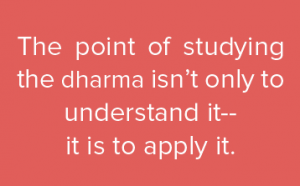Meditation: Am I Doing it "Right?"
April 11, 2012 | 15 CommentsThis past Monday, I went to hear a talk from the wonderful Tibetan Buddhist teacher, Tsoknyi Rinpoche who has a new book called Open Heart, Open Mind. I haven’t read it yet, but it sounds great. And I loved what he had to say about it.
He started out by saying that when he first came to the West to teach, he really focused on (and I’m paraphrasing here) explaining the essential points of the dharma as clearly as possible. People picked up on this very quickly, he said. But something wasn’t quite right. They seemed to comprehend the outer meaning but not, as he phrased it, the “heart meaning.” He realized, he said, that in the West cognitive ability is very, very strong—but emotional comprehension is weak. In the East, he continued, heart energy is good. People are more likely to feel happy and the focus on “getting things done” may take a back seat. For us, it is the opposite, even, he hinted, extremely so. And when cognitive capability is emphasized and emotional intelligence is not and it’s all married to a fear-based education system that encourages accomplishment over all things—it can be quite difficult to understand and apply the dharma.
So, whether or not you hold with his view of East vs West, I think we can agree that, for many, many of us, there is an undue focus on achievement. And, hey, I’m all for achievement. I myself am very ambitious and hope to accomplish much in this lifetime, on all sorts of levels. But when I try to apply to meditation practice my normal way of jumping in, pushing myself, trying to hit certain marks and then challenging myself further the moment I do, well, it just doesn’t “work.” Meditation is very interesting this way. I can personally attest to the notion that the fruits of meditation are real. I’ve been practicing for over 15 years and there aren’t enough words in this or any other language to explain the profound impact of this practice on my world. It changes everything. Everything. Even if I could explain it, it would sound nutty because it is just so personal. For each of us, the journey of meditation will be different and I can’t tell you what it will look like for you.
I can, though, tell you this: that the true meaning of your practice arises when you do one thing and this one thing has way, way more power than trying your super-hardest best or willfully throwing yourself at the dharma—and that thing is this: RELAX.
Release your agenda. If you can’t, release your agenda to release your agenda. It’s OK.
Stop trying so hard all the time. If you can’t, then relax with yourself as one who just really, really wants to try. It’s OK.
And, if possible, try to stop wondering if you are doing it “right.” Of course it is so normal to wonder this about your meditation practice. But here’s something to contemplate as you go forward into your practice on this or any other day. As long as you make the effort to apply the technique, there is no way to do this practice wrong. However, there is also no way to do it right. So as you experience moments of so-called failure—I’ll never get this meditation thing down—rather than beating yourself up and redoubling your effort, relax and appreciate yourself for your great, noble, and unending intention to improve your world, then let go and return to your breath. As you experience moments of so-called success—I think I’ve got this meditation thing nailed!—rather than wondering, OK, what’s the next mark I’ve got to hit, relax and appreciate yourself for your supremely capacious mind, then let go and return to your breath.
To learn meditation and receive ongoing support for your practice, please sign up for The Open Heart Project.
categorized in: dharma, meditation, open heart project


15 Comments
YES. Also, insert “mothering” instead of meditation–and oh, oh I so needed that. Thank you.
Love this!
I’ve always been a bit competitive and aspired to be the best meditator in the room and earn the praise and admiration of all. It was really hard for me to let go of that – -to know that, when I sit down at home on that cushion, no one sees me or knows I’m there. So, when I am actually capable of intermittently letting go of that agenda of accomplishment, it’s felt like a very big, well, accomplishment … I had never considered that my Western socialization had played a large role in that, but I am sure that you are right that it does.
One thing that always strikes me about Buddhism and about Eastern things generally, is that they are very tolerant of paradox. When we let go of our expectations that things are going to get better as we practice, things seem to get better. We’re not supposed to hold onto those expectations of accomplishment, but of course we all do this with the expectation of accomplishing something yet we often do accomplish *something*, even if it’s not necessarily the something we envisioned.
I’m not sure if that makes any sense at all. But at least I’m relieved to not have to keep checking the mailbox everyday for that meditation trophy that never seems to arrive!
Emily
Emily, I totally share your aspirational nature. And I also know what a relief it is to find those moments of letting go. I wish you many such paradoxical moments of reaching your destination through non-striving.
Now let’s get to work designing that meditation trophy!
xo S
Dear Susan, thank you for this blog… it’s refreshing to know that there is actually not a wrong way to do something! On a separate note, perhaps you can explain what appears to me as a paradox: how one should live primarily in the present moment, and not think too hard on the past or future, yet at the same time be ambitious and desire to accomplish alot in the future.
Hi Michael. Good question. I think that ambition and desire exist in the present and so relating to them with intelligence and kindness is totally possible. It’s when we spend too much time “living” in the future we anticipate through our ambition and desire that problems can arise. Please let me know if this answers your question. Warmly, S
Susan, what I’m trying to understand is why ambition and desire are not forms of “craving” to be avoided in order to end or minimize “suffering.”. I realize I must be missing something in the meaning of “craving”– but I just don’t know what. Thank you for your patience. (And apologies for being off topic from your blog.)
Thank you so very much for pointing to this teacher and book. A warm vibe I so needed right now!
Carol, sending more loving vibes! xo S
I love how just when you need it( whatever it is)it’s there. This post was that for me. I sat today and heard myself look at all the people around me and their issues, I proceeded to “fix” them with all kinds of mental ideas and then I relaxed and things fell right into place. Then again, back to the internal talk about how to fix myself and count the ways I am failing… then I relaxed and again it all fell into place(for about 2mins). It’s so hard not to want to get somewhere else. More well, more happy, more, more, more. These teachings fill my heart and while I fight striving to get somewhere else I will try to remember to relax:) Thanks again!
Dawn, so glad this post hit home for you. And I completely relate to the advice-giving meditation technique you describe! I spend a lot of time thinking about fixing what is wrong. It is great to know that there is a way to always, always appreciate ourselves with great good humor for wanting things to be better; letting go; coming back. I am trying this right along with you. xo S
Ha! I wonder why I keep receiving messages about aimlessness, letting go of spiritual materialism, and now this? Okay, okay, it’s beginning to sink in: Give up (everything). Let go (of everything). Relax. Breathe.
Relax. Breathe.
Repeat.
Seems so simple. I wonder why I need all these reminders?!?!
We all do!!